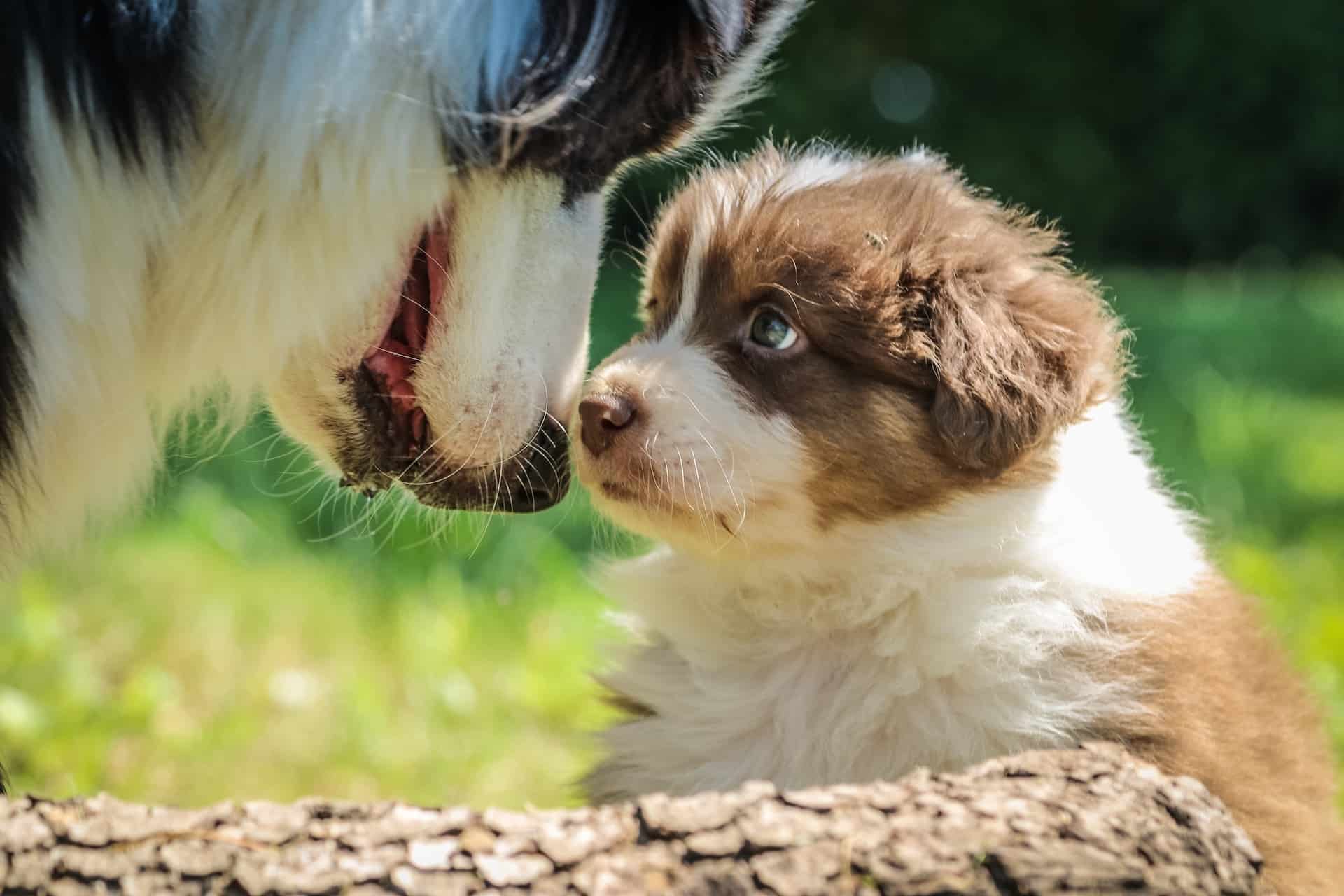| TL;DR: Dog vaccines come in two types: core and non-core. Core vaccines are critical for a puppy as they protect them against diseases with risk of exposure, severe illness, and even potential transmission to humans. The two essential core shots puppies should receive the DAPP and Rabies vaccines. For the non-core vaccines, it’s best to consult your veterinarian and create a personalized vaccine schedule based on your pet’s lifestyle, age, and health status. |
If you’re considering adopting a puppy, you’re in for a real treat. Pups are notoriously playful troublemakers; they will make you smile and feel loved — that is a fact! Did you know that petting your dog can lower your blood pressure levels?
However, taking care of a puppy comes with responsibilities. In this article, we will go through everything you need to know about vaccinating your pup so that they can stay happy and healthy.
We’ll also answer some of your most common questions about getting their dogs vaccinated. So, if you’re ready to learn how to keep your pup in tip-top shape, let’s get started!
Dog vaccines come in two types: “core” and “non-core”. According to the American Animal Hospital Association (AAHA), there are two core and five non-core vaccines:
Core Vaccines Every Puppy Needs
Core vaccines are essential shots to protect your pup from the most widespread illnesses. Vital for all dogs, they are necessary to prevent severe diseases and reduce the risk of transmission to other dogs, pets and humans.
???? DAPP (or DA2PP/DHPP) vaccine
A combination vaccine for Canine Distemper, Canine Hepatitis (Adenovirus), Parvovirus and Canine Parainfluenza.
DAPP protects pups against four common, severe diseases:
- Canine Distemper — This highly contagious viral infection attacks the respiratory, gastrointestinal and nervous systems. It spreads quickly through coughing, sneezing and other body fluids from infected animals and can be fatal for dogs.
- Canine Hepatitis / Adenovirus — Vaccines for adenovirus type 2 protect against adenovirus type 1 and 2. Type 1 is a viral infection that affects the upper respiratory tract, the liver and the kidneys with a potentially fatal outcome. It can also lead to “hepatitis blue eye”. Type 2 causes respiratory illness and may lead to kennel cough.
- Canine Parvovirus — Commonly referred to as “parvo,” this is one of the most severe viruses dogs can get. Particularly contagious in puppies, it can cause diarrhea, vomiting, lethargy, dehydration and fever and can even be fatal due to dehydration and shock in severe cases.
- Canine Parainfluenza — This viral disease also affects the respiratory system and is often associated with developing kennel cough and infectious bronchitis that, if severe, may progress to life-threatening pneumonia.
???? Rabies virus vaccine
This viral disease affects the central nervous system of domestic pets, wildlife and humans. Although easily preventable with vaccination, it is usually 100% fatal once symptoms appear.
According to the WHO, dogs transmit the virus to humans in up to 99% of cases. The disease initially presents with generic symptoms, such as fever and pain and later progresses to fatal brain and spinal cord inflammation.
Non-Core Vaccines Puppies Can Get
Non-core vaccines, also known as “lifestyle vaccines”, depend on specific aspects of a puppy’s lifestyle: geographic location and the risk of diseases in the area; the dog’s regular activities and their usual exposure to the wilderness; and the overall health of your pet.
There are five vaccines like this:
???? Bordetella Bronchiseptica
A highly infectious bacterium, chief agent of kennel cough.
???? Borrelia Burgdorferi
Also known as Lyme Disease, ticks spread this bacterial infection and affect domestic animals and humans. It can cause joint swelling, limping, fatigue, loss of appetite and severe kidney complications in dogs.
???? Canine Influenza
AKA dog flu, a relatively new virus in dogs. It causes an acute respiratory infection and flu-like symptoms, similar to kennel cough. Some dogs are more severely affected and can exhibit clinical signs of pneumonia.
???? Leptospirosis
A bacterial, potentially life-threatening disease that spreads through infected animals’ urine. It can cause severe kidney or liver failure. Infected dogs can seem healthy but still pass Leptospira bacteria. As a zoonotic disease, it can infect people as well.
???? Rattlesnake toxoid (Crotalux atrox)
This vaccine helps lessen a dog’s reaction to snakebites and their venom.
| ???? Pro tip: Heartworm is a severe disease for which there is no vaccine, but it can be easily prevented with medication that your vet can prescribe. Heartworms, as the name indicates, nest in dogs’ hearts and can cause lasting damage to the heart, lungs and arteries. It can affect the dog’s health and quality of life even after the parasites are gone. |
Deciding which non-core shots to administer is something to discuss with your vet, and together create the proper vaccination plan for your puppy’s needs.
Why Do Puppies Need Vaccinations?
Being a dog parent is more than snuggles and playtime. It is also about ensuring your pet’s long-term well-being. This includes safeguarding them from many serious health complications through vaccines.
When puppies are born, they are naturally protected from infections and illnesses, thanks to the antibodies passed on from their mother’s milk. However, as they grow older, this protection wanes. By administering your pup with the required vaccines, their immune system will be trained to identify and fight off disease-causing agents.
While some shots, such as rabies, are mandatory in most US states, giving your pup proper immunity against dangerous, preventable diseases is crucial.
Here’s why:
???? Your pup needs to be protected against illnesses and infections that can spread between dogs and other domestic animals, especially if you have other pets.
???? Wild animals can also transmit lethal contagious diseases to your pet. Since dogs are naturally curious, contact with wild animals won’t be easily avoided. Vaccination will ensure their safety and your peace of mind.
???? Some diseases can be transmitted from animals to people; vaccinating your puppy will protect you and your family.
???? By vaccinating your pet, you can also avoid expensive treatments for preventable diseases.
Puppies Vaccination Schedule
Each pup has unique vaccination needs that depend on its lifestyle and overall health. However and as a general guideline, the vaccination schedule for puppies typically goes like this:
| AGE | CORE VACCINES | NON-CORE VACCINES |
| 6-8 weeks | DAPP (distemper, adenovirus, parainfluenza, parvovirus) | Bordetella |
| 10-12 weeks | DAPP (distemper, adenovirus, parainfluenza, parvovirus) | BordetellaCanine influenzaBorrelia Burgdorferi (Lyme disease)Leptospirosis(as recommended by the veterinarian) |
| 16-18 Weeks | DAPP (distemper, adenovirus, parainfluenza, parvovirus) Rabies vaccine (may be given earlier if required by law) | BordetellaCanine influenzaBorrelia Burgdorferi (Lyme disease)Leptospirosis(as recommended by the veterinarian) |
| Every 1 to 2 years | DAPP (distemper, adenovirus, parainfluenza, parvovirus) | BordetellaCanine influenzaBorrelia Burgdorferi (Lyme disease)Leptospirosis(as recommended by the veterinarian) |
| Every 1 to 3 years | Rabies (as required by law*) | None. |
*Here’s a table with the information on rabies requirements per state.
As for Rattlesnake toxoid, dosing requirements and frequency of administration vary among dogs depending on body weight and exposure risk.
Common Questions About Puppy Vaccinations
???? Are there risks for puppy vaccinations?
Potentially, yes. However, the benefits of vaccinations greatly outweigh any risks. Throughout this article, we have examined the serious harm completely vaccine-preventable diseases can produce.
As with human vaccines, puppies may experience mild, short-lived symptoms after vaccination: from soreness at the injection site to mild fever and allergic reactions. To be safe, you can always schedule your puppy vaccine appointment at a time when you can monitor them after the shot.
???? When can a puppy go out after vaccination?
New pet owners can be eager to take their puppies out and introduce them to the world. However, the first outing with your pup is an important milestone that requires preparation and patience.
Puppies need to be immunized with the complete primary set of shots: the DAPP vaccine series, administered at intervals of around three weeks until they reach 16 to 20 weeks of age. Two weeks after receiving their last DAPP vaccine, your pup is fit to go outside.
???? How much does it cost to keep a dog per year?
Being a responsible dog owner can be costly. According to the American Society for the Prevention of Cruelty to Animals (ASPCA), the annual cost to cover food, treats, toys, routine checkups and health insurance is about $1,400.
Although planning and budgeting for routine pet care are possible, accidents or severe health issues may occur unexpectedly. The most innovative way to save money and avoid costly bills is by keeping up with preventive care. And this includes vaccines, do not doubt it. Also, getting insurance when your dog is still a playful cute pup will likely result in more favorable rates and broader coverage.
By ensuring your dog stays healthy and happy, the rewards of their love and companionship will undoubtedly make it all worthwhile.
???? How much do puppy vaccinations cost?
The cost of vaccinating your puppy will vary depending on your location and the shot schedule you and your vet decide on. But you can estimate an average of $100 to $350 for the first year. Here’s a price estimator.
| ???? Pro tip: Some government-sponsored animal shelters may offer vaccines at lower prices. Also, if you are adopting your puppy from a shelter or rescue organization, some vaccines will already be included in your adoption fee. |
Don’t forget to budget for booster shots (in one or three-year intervals) to ensure your pet stays protected.
Final Thoughts
Vaccinations are fundamental to responsible dog ownership, but it is essential to recognize that not all dogs require the same vaccines.
While core vaccinations are typically recommended for all healthy dogs, individualized vaccine schedules can help guard against disease and safeguard the health and well-being of your pup.
By staying informed and proactively approaching dog vaccination, owners can provide their furry friends a lifetime of happy, healthy, tail-wagging moments.
| SOURCES AAHA Canine Vaccination Task Force (2022). Recommendations for core and noncore canine vaccines. aaha.org AVMA. (2023). Canine Parvovirus. avma.org AVMA. (2022) Canine Influenza. avma.org AVMA. (2022). Leptospirosis In Dogs. avma.org Banfield Pet Hospital. (2023). Vaccine Price Estimator. banfield.com Brooks, W. (2022). Kennel Cough in Dogs. vin.com CDC. (2018). Key Facts about Canine Influenza. cdc.gov Dodds W. J. (2021). Early Life Vaccination of Companion Animal Pets. ncbi.nlm.nih.gov PetCoach. (2023). Blue Eye in Dogs. petcoach.co Vogt, N. A. (2022). Lyme Borreliosis in Animals. Merckvetmanual.com WHO. (2023). Rabies. who.int |





